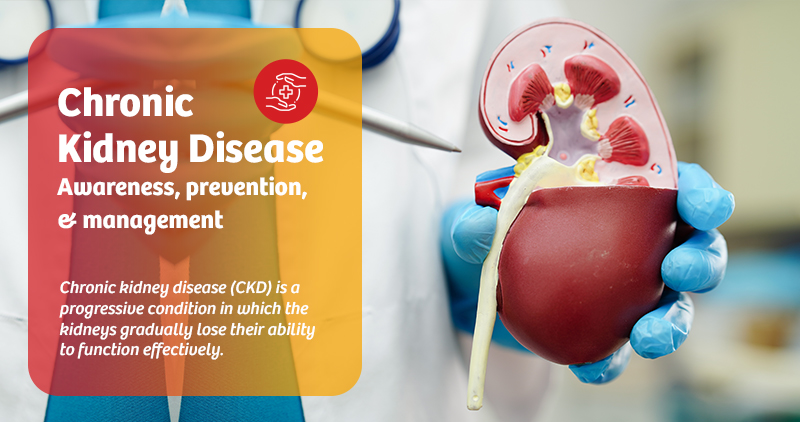Chronic kidney disease (CKD) is a progressive condition in which the kidneys gradually lose their ability to function effectively. The kidneys are essential organs that filter waste and excess fluids from the blood, playing a crucial role in maintaining the body’s overall health. When they become damaged, harmful toxins build up in the bloodstream, leading to serious health complications.
In India, CKD is emerging as a public health concern, driven by the rising prevalence of diabetes, hypertension, and lifestyle-related diseases. Despite its growing impact, there is still a lack of awareness, causing many cases to go undiagnosed until the disease reaches an advanced stage.
CKD in India: The growing burden
In recent years, India has witnessed a sharp increase in CKD cases, making it one of the leading causes of mortality and morbidity in the country. According to health reports:
- 1 in 10 Indians suffers from some form of kidney disease.
- Diabetes is the leading cause, accounting for 40–50% of CKD cases.
- Hypertension contributes to 20–25% of cases.
- Rural and semi-urban populations are particularly vulnerable due to limited access to healthcare and lack of awareness.
- CKD often goes undiagnosed in its early stages, with many patients seeking medical help only when the disease has progressed significantly.
What causes CKD ?
CKD has multiple causes, but certain factors are more prevalent in the Indian population:
1. Diabetes and hypertension:
- Diabetes mellitus (Type 1 & 2) is the most common cause of CKD in India. Persistent high blood sugar damages the small blood vessels in the kidneys, impairing their filtering ability.
- Hypertension (high blood pressure), another major cause, exerts excessive force on the blood vessels, leading to kidney damage over time.
- A large portion of the Indian population suffers from undiagnosed or poorly controlled diabetes and hypertension, increasing their risk of developing CKD.
2. Untreated infections:
- In rural India, recurrent urinary tract infections (UTIs) and kidney stones are common due to poor sanitation and hygiene.
- Untreated or improperly managed infections can gradually damage the kidneys, resulting in chronic kidney disease.
3. Painkillers and self-medication:
- The widespread use of over-the-counter non-steroidal anti-inflammatory drugs (NSAIDs), such as ibuprofen and diclofenac, is a growing concern.
- Frequent use of these painkillers without medical supervision can lead to nephrotoxicity, contributing to kidney damage.
4. Poor water quality:
- In many parts of India, particularly rural regions, people consume water contaminated with fluoride, arsenic, or heavy metals.
- Long-term exposure to these contaminants damages kidney dysfunction.
5. Genetic and hereditary factors:
- Polycystic kidney disease (PKD) and other inherited conditions are also known to cause CKD.
- Individuals with a family history of kidney disease have a higher risk of developing CKD.
Symptoms of CKD
CKD is called a “silent disease” because it may not show noticeable symptoms in its early stages. However, as the disease progresses, the following signs may appear:
- Fatigue and weakness: Due to anaemia or toxin buildup.
- Swelling (Edema): Especially in the feet, ankles, hands & face.
- Changes in urination: Frequent urination, foamy urine, or colour changes..
- Loss of appetite and nausea: Common in later stages.
- Persistent itching and muscle cramps: Due to electrolyte imbalances.
- Shortness of breath: As fluid builds up in the lungs.
Diagnosis of CKD
Early detection of CKD is crucial for slowing its progression. In India, individuals with diabetes, hypertension, or a family history of kidney disease should undergo regular screening.
Key diagnostic tests include:
- Blood tests: To measure creatinine and urea levels, indicating kidney function.
- Urine tests: To check for protein (proteinuria) or blood in the urine.
- Imaging tests: Ultrasound or CT scans to detect structural abnormalities.
- Biopsy: In some cases, a kidney biopsy is recommended to determine the cause of CKD.
Preventing CKD: Lifestyle changes
Since lifestyle diseases are major contributors to CKD in India, adopting healthier habits can significantly reduce the risk.
1. Healthy diet
- Reduce salt intake to prevent high blood pressure.
- Opt for a low-protein diet in case of CKD, as excess protein can burden the kidneys.
- Include fiber-rich foods such as whole grains, legumes, and vegetables.
- Limit processed and packaged foods, which often contain hidden salts.
2. Stay hydrated
- Drink plenty of water to flush out toxins and reduce the risk of kidney stones.
- Avoid sugary and carbonated drinks, which can contribute to metabolic issues.
3. Regular physical activities
- Engage in 30–45 minutes of moderate exercise daily.
- Exercise helps manage blood sugar and blood pressure, reducing the risk of kidney damage.
4. Avoid self-medication
- Do not take painkillers or antibiotics without medical supervision.
- Seek proper treatment for infections and urinary issues.
5. Routine health check-ups
- Regular check-ups can help detect early signs of CKD, especially in individuals with diabetes or hypertension.
- Kidney function tests, including creatinine and eGFR, should be part of routine health screenings.
Treatment options for CKD
Although CKD cannot always be reversed, early diagnosis and proper management can slow its progression and improve quality of life.
1. Medications
- Antihypertensive drugs: To control blood pressure.
- Diabetes medications: To manage blood sugar levels.
- Cholesterol-lowering drugs: To reduce cardiovascular risk.
- Anaemia treatment: Injections or iron supplements to manage low haemoglobin levels.
2. Dietary management
- Low-sodium and low-protein diets are often recommended for CKD patients.
- Controlled potassium and phosphorus intake to prevent electrolyte imbalances.
3. Dialysis
- In advanced CKD (stage 5), dialysis is needed to remove excess waste and fluids.
- Hemodialysis and peritoneal dialysis are commonly available in Indian hospitals.
4. Kidney transplant
- For end-stage CKD, a kidney transplant is often the only option.
- However, access to transplants in India is limited due to organ shortages.
In a nutshell :
At KD Hospital, we provide specialised care for chronic kidney disease (CKD), emphasising early diagnosis, effective management, and advanced treatment options. Our multidisciplinary team, including nephrologists and dietitians, collaborates to slow disease progression and enhance quality of life.

